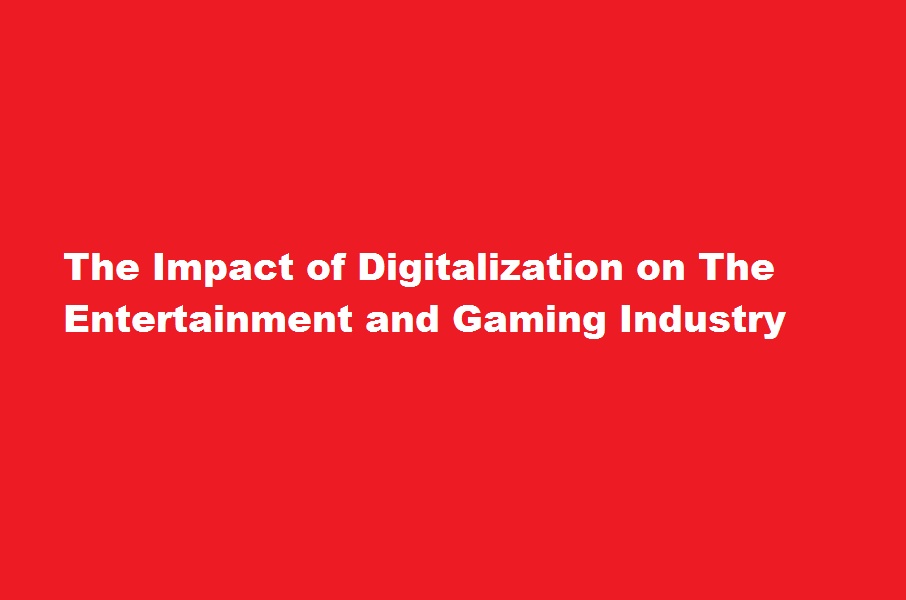The Impact of Digitalization on The Entertainment and Gaming Industry
4 min read
Introduction
Digitalization has brought about a paradigm shift in the entertainment and gaming industry, reshaping the way we consume and engage with various forms of entertainment. From the rise of online streaming platforms to the advent of virtual reality and the popularity of mobile gaming, digital technologies have revolutionized the entertainment landscape. This article explores the key ways in which digitalization has impacted the entertainment and gaming industry, transforming content creation, distribution, and user engagement.
Streaming Platforms and Content Distribution
Digitalization has revolutionized the way we consume entertainment content. Online streaming platforms like Netflix, Amazon Prime Video, and Disney+ have gained immense popularity, offering on-demand access to a vast library of movies, TV shows, and original content. This shift towards digital streaming has disrupted traditional distribution models, allowing consumers to watch their favorite content anytime, anywhere, and on multiple devices.
Virtual Reality (VR) and Augmented Reality (AR) Experiences
Digitalization has introduced immersive technologies like virtual reality (VR) and augmented reality (AR) to the entertainment industry. VR allows users to experience virtual worlds and scenarios, creating a more immersive and interactive entertainment experience. AR enhances the real-world environment by overlaying digital elements, enabling interactive gaming experiences and bringing characters and content to life.
Mobile Gaming and Esports
Digitalization has led to the rapid growth of mobile gaming and esports. The widespread availability of smartphones and tablets has made gaming accessible to a broader audience. Mobile games offer engaging and immersive experiences, ranging from casual puzzles to competitive multiplayer games. Esports, organized competitive gaming events, have gained significant traction, attracting millions of viewers and creating new avenues for professional gaming careers.
User-generated Content and Social Media Engagement
Digitalization has empowered users to become content creators and engage with their favorite entertainment platforms through social media. Platforms like YouTube, TikTok, and Instagram allow users to create and share their own videos, music, and performances, cultivating a global community of content creators and enthusiasts. Social media has become a hub for fan engagement, where users can interact with their favorite entertainers, participate in challenges, and share their experiences.
Data Analytics and Personalized Recommendations
Digitalization has enabled data-driven insights and personalized recommendations in the entertainment industry. Streaming platforms and gaming companies utilize data analytics to understand user preferences, viewing habits, and gaming behavior. This data is leveraged to provide personalized recommendations, suggesting content and games tailored to individual interests, enhancing user satisfaction and driving engagement.
Frequently Asked Questions
How has digitalization impacted the film industry?
Digitalization has had a profound impact on the film industry. Digital cameras and advanced editing software have transformed the filmmaking process, making it more accessible and cost-effective. Digital distribution platforms have provided new avenues for independent filmmakers to showcase their work. Online streaming platforms have disrupted the traditional distribution model, allowing for a wider reach and on-demand access to films.
How has digitalization affected the music industry?
Digitalization has revolutionized the music industry by transforming how music is created, distributed, and consumed. Digital audio workstations and software have made music production more accessible and affordable. Streaming platforms and online music stores have replaced physical media, allowing for instant access to a vast library of music. Social media and digital marketing have provided new avenues for artists to connect with fans and promote their music.
How has digitalization influenced the gaming industry’s development and innovation?
Digitalization has played a pivotal role in the development and innovation of the gaming industry. Digital distribution platforms like Steam and app stores have facilitated the distribution of games to a global audience. Online multiplayer capabilities have revolutionized the gaming experience, allowing players to connect and compete with others worldwide. The advent of virtual reality, augmented reality, and cloud gaming has opened up new possibilities for immersive gaming experiences.
Conclusion
Digitalization has had a transformative impact on the entertainment and gaming industry, revolutionizing the way we consume and engage with content. From the convenience of online streaming platforms to the immersive experiences of virtual reality and the widespread popularity of mobile gaming and esports, digital technologies have reshaped the entertainment landscape. As digitalization continues to advance, the industry must adapt to embrace new technologies, engage with audiences on digital platforms, and create innovative and immersive experiences to cater to the evolving preferences of consumers.
Read Also : The Digital Transformation of The Travel and Tourism Industry






